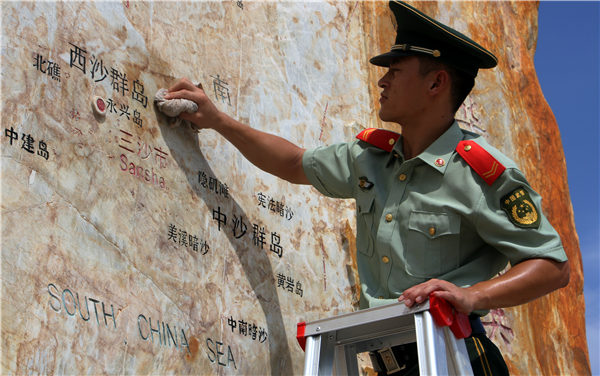
A guard cleans a stone map on Yongxing Island that indicates the locations of various districts of Sansha city, Hainan.[Photo by WEI TAOZE/CHINA DAILY]
Childhood dream
One morning in January 2015, Ma Kunrong, 28, was cleaning the police stele on Jinqing Island, a 0.21-sq-km outcrop in the Xisha archipelago. "You only need to take 2,200 steps to walk around it," said Ma, who was the senior of the two frontier guards stationed on the island, protecting about 30 people.
His subordinate, an officer surnamed Gao, complained about him wiping the stone tablet every day. "Nobody is going to check in this forsaken place, not even the birds fly here," he said.
Gao's words broke Ma's heart - it had been his childhood dream and "greatest honor" to guard the "nation's southern gate". He was so enthusiastic that he applied four times to be transferred from his post in Hainan Island, China's most southerly province.
"My father, who served in the South China Sea, told me: 'This is our ancestral land, every drop of sea is blood and every grain of sand is treasure, so guard them with your life', so this is more than a tablet with our insignia and contact details. It represents our sovereignty and our duty to keep our people safe," he told Gao.
The two remained at their posts for two months before they were relieved. When they returned to Yongxing, both had long hair, darkened skin and they reeked of sweat and dead fish, "We looked like savages," Ma said. "But I loved it so much that I signed up for more."
According to Wang Xinghai, the division's political instructor, Sansha's miniscule population means the crime rate is very low - there have only been 15 criminal cases in the five years since the city was founded - so guarding the islands can appear tedious.
"But, given the significance of Sansha, any minor trouble, if mishandled, could escalate into a diplomatic incident. So, officers have to stay alert even during their daily tasks," the 33-year-old said.
Wu Chen, a 29-year-old guard, said the tasks include conducting patrols, reporting unidentified ships and cleaning beachheads, but the most satisfying work is helping the local people.
In October, when Typhoon Sarika was heading toward Yongxing, Wu and two colleagues rushed to the fishermen's pier at 11 pm to ensure that the vessels were securely tied down.
"The wind blew, the rain poured and waves as high as 2 meters smashed down on our heads," he said. "Even our divisional director, who is built like a brick wall, had trouble standing upright."
The three men worked from 11 pm to 6 am, and by the time the typhoon made landfall, they had ensured the safety of about 20 boats.
"Every boat saved means a family's livelihood is secure," Wu said. His comrades, including Ma, spent their time reinforcing people's homes and escorting residents to safe areas.
"Whenever there is trouble, we are the first to help," said Ma.